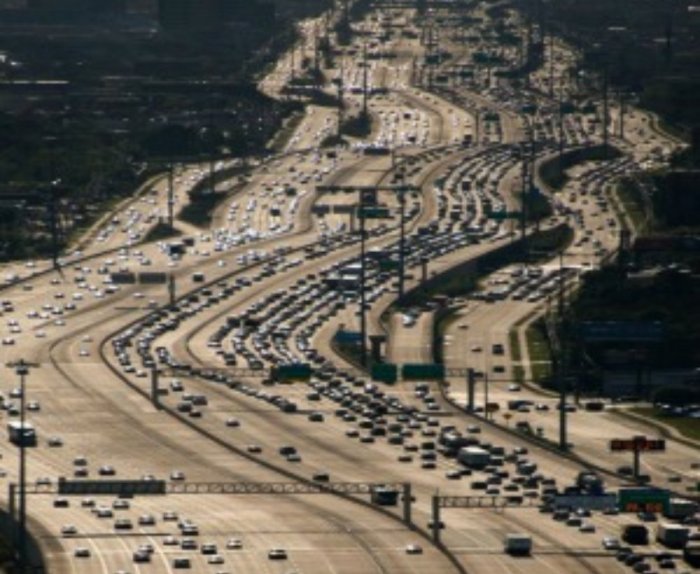Sydney’s population will grow by another 1 million people in the next 10 years. What’s the best way to transport all these extra people and make Sydney are better place to live? Lots of people think that we just need to build more roads to “bust congestion”. But are more roads and motorways the best solution? Here are 11 reasons building more motorways is a bad idea.
Roads are not good value for the money
My rough calculation based on NSW Govt information regarding costs of the Western Harbour Tunnel and the Sydney Metro and capacity for each shows that Capital cost per person per day transported for the tunnel is about $31/day vs the metro $9/day. Its roughly cost 3 times as much to transport people via a motorway tunnel than a metro. The difference could be much better used for education and health or to build a metro.
Cars are a really inefficient mode of transport
Here’s a diagram showing capacities of various forms of transport with cars the least efficient and metro trains the most. Energy usage is even worse, with cars using over 10 times as much energy as trains. Compared to biking 75 times as much. We are investing billions in the least efficient way to “bust congestion”.

Building new roads won’t bust congestion
The Katy Freeway in the Houston metro area is the widest freeway in North America at 26 lanes. It was expanded to alleviate severe traffic congestion, but it actually got worse.
It’s counter intuitive but adding new roadway capacity also creates new demand for those lanes or roads, maintaining a similar rate of congestion, if not worsening it. Economists call this phenomenon induced demand: When you provide more of something, or provide it for a cheaper price, people are more likely to use it.
So, building more roads won’t necessarily bust congestion-it might make it worse.
Car exhaust is really bad for you
14% of deadly pm2.5 particulates in the air come from urban traffic. The closer you are to a road the higher this is. 7% of nitrous oxide pollutants come from urban traffic. It’s even worse if you’re driving in it.
Cars are bad for our oceans
28% of microplastics in our oceans come from car tires. More cars mean more microplastic pollution.
Roads take up way too much space already
We pave over a lot of our urban environment for roads. 41% of urban Sacramento (similarly car dependent to Sydney) is used for roads and car parks vs vegetation 30%. We should be giving common spaces back to communities rather than taking it away.
Roads are hot and contribute to Global Warming
The urban heat island effect where cities are typically 1-3 deg hotter than the surrounding countryside is partly due to the heat absorbing properties of black asphalt roads. The heat island effect increases summertime peak energy demand, air conditioning costs and water demand.
Roads are Noisy
Roads are noisy, and noise is bad for your health. Continuous exposure to it effects our heart and mental health. Our governments do very do very little or the absolute minimum to reduce the effects of traffic noise on neighborhoods surrounding motorways .
Roads are deadly
1146 people were killed and a staggering 32,300 were injured on roads on roads Australia in 2019. Since 1925, 190,000 people have been killed on the roads in Australia. By comparison over 100,000 Australians have been killed in all wars. In Australia’s worst day in war 1,279 Australian troops died during the battle of Passchendaele-about the same as one year on the roads.
Roads divide communities
Busy road essentially divide communities with a dangerous, noisy and polluting barrier to community connections. They make people go out of their way or difficult to cross them. They reduce or eliminate the physical connections that create communities.
They create unpleasant places
People actually love car-free environments and travel great distances to be in them. Think of your favorite tourist destination and it’s probably car free. Now think of the worst place you have ever stood in and it might be somewhere like a highway underpass or next to a busy motorway.
Some cities are starting to remove freeways to make their cities more liveable. San Francisco successfully removed the Embarcadero Freeway. The result was a triumph for downtown San Francisco, which now has kilometers of public space, walking and bike paths, plus new transit routes where the double-decker freeway once was. Other successful removals include The Alaskan Way, Seattle, Rio Madrid, Madrid and Harbour Drive Portland.
Around the world cities are questioning the place of cars and the costs of providing space and infrastructure to accommodate them. Paris in undertaking a major transformation now to eliminate or drastically reduce cars in the city. Why? Because it will make a better place to live.
And for those that think electric cars will solve all our problems-how many of the above issues will they solved by electric cars, even assuming they are charged with fully renewable energy?
We really have to reduce our dependence on cars to make our cities more livable. Isn’t it about time we had a sensible debate about the costs and benefits of more motorways for Sydney?
Visit thewaroncars.org for more information on alternatives to cars
Sources:https://bigthink.com/design-for-good/la-is-painting-its-streets-white-to-cool-down-the-city
https://www.citylab.com/transportation/2018/09/citylab-university-induced-demand/569455/
https://www.nationalgeographic.com/environment/2019/09/tires-unseen-plastic-polluter/
https://www.budgetdirect.com.au/car-insurance/research/car-accident-statistics.html
https://soe.environment.gov.au/theme/climate/topic/emission-sources
httpps://laqm.defra.gov.uk/public-health/pm25.html
https://www.citylab.com/transportation/2018/09/citylab-university-induced-demand/569455/
Click to access The_Fundamental_Law_of_Road_Congestion_Evidence_from_US_Cities.pdf
https://heatisland.lbl.gov/publications/analyzing-land-cover-urban

